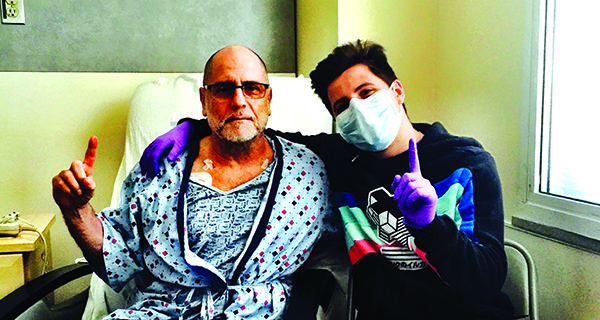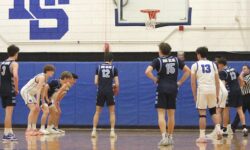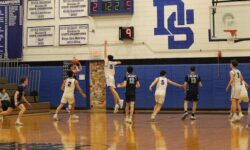[ccfic caption-text format="plaintext"]
By Stephen Press
Hometown Weekly Staff
Needham’s Dennis Ozer is many things. He is a father and husband. He is the co-owner of H.Y.P. Studio, a yoga and pilates facility with branches in Medfield, Needham, and Wellesley. He is, in the words of his wife, Debra Goodman, “the mayor of everything” and “like the Tasmanian Devil in the best way.”
He is also a survivor.
12 years ago, Ozer was diagnosed with acute myeloid leukemia. At the time, he and Goodman were both working in the large-format graphics industry with children aged eight and 13.
Unable to find a proper match for a bone marrow transplant, Ozer turned to an at-the-time experimental cord-blood transplant. The hope was that the stem cells that were so abundant in the cord-blood would effectively build him a new immune system, replacing his own, diseased one.
The treatment was an astonishing success. Over the course of the next year, Ozer underwent the process of regrowing an immune system. The rigorous treatment was not without its pitfalls, however. For one, he needed to be quarantined while his body slowly rebuilt its ability to fight disease. This was on top of the treatment itself, which physically wore him down.
“He must have lost - between the induction chemo and stem cell part - about 50 lbs. He was very weak when he got home,” explains Debra, reminiscing about Dennis’ treatment. “He had to rebuild and readdress his body. I had started doing yoga - I’d done pilates and added yoga in - I had one of the yoga teachers come to the house with mask and gloves to work with him.”
What began as just another component of Dennis’ return to health became a load-bearing pillar of his overall wellness.
“It was a huge component of his getting better. I could see the difference it made in him,” affirms Debra. It was eye-opening for her “to see yoga and that kind of modality go so far in bringing him back to help - not just physically, but in that mind-body component as well.”
It also proved to be a catalyst for major life change.
When Ozer made a full recovery a year later, the yoga and pilates that had played such an important role in his convalescence became a full-time job with the opening of H.Y.P. Studio.
Flash forward to over a decade later.
H.Y.P. has grown and expanded to open branches in Wellesley and Medfield. Ozer and Goodman’s children are in their twenties. Ozer has gone in for a scheduled check-up with the doctor, who informs him that his platelet count is low. A bone marrow biopsy comes up negative, but Goodman’s intuition (and her perusal of Dennis’ other blood markers, which are also drifting down) leads her to encourage doctors to look again. It is intuition that saves her husband’s life, as Ozer is again diagnosed with leukemia.
“Advocate, advocate,” encourages Debra. “Doctors are wonderful - I’m thrilled we’re at Dana Farber in Boston - but you know the person you love better than anyone else.”
That still leaves the matter of Ozer’s treatment. “Here we are in this very rare situation,” says Debra. “He’s an outlier in that he’s outlived the survival statistic by a good 8 years.”
His doctors suggest a half-match (haploidentical) transplant, which instantly panics Goodman; a decade earlier, the half-match was a treatment of last resort, an experiment reserved for those in the last stages of the disease. Now, she is assured, the intricacies of the treatment have been solved and mastered. All that is needed is a donor in good health.
Enter Dennis’ son, Jakob.
While his father undergoes conditioning chemotherapy in preparation for the donation, Jakob receives five days worth of Neupogen injections to stimulate his bone marrow. The medication is a white blood cell booster, making his marrow go into overdrive. He returns home every day feeling drained and tired, a sign that the drug is doing its job.
“Jakob would come to me and say, ‘I feel so crappy,’” says Debra. “And I’d say ‘Nice! It’s working!’”
Finally, on the fifth day, Jacob goes through apheresis to separate the stem cells from his other blood products (which are subsequently returned to his system). His stem cells are transplanted into his father.
After three weeks, Dennis’ blood counts are up - the transplant is taking hold; Ozer’s body is not rejecting it. It is a joyous moment for Dennis and his family.
“In some ways, this time around has been easier. I don’t have little kids at home - they were 13 and 8 last time. At least this time, my kids are older, but the emotional impact of having him sick again really sent me into a tail-spin,” explains Debra. “Yesterday, I said: ‘I feel like I have my mojo back. I feel like I can breathe again. I just breathed again for the first time in a month. It’s that transformative. It’s that big for me.’”
The road to recovery is still a long one, however, with Ozer still staring at eight months (or more) of quarantine. He can walk outside, but carefully. He has to avoid fruits and vegetables - part of the marrow transplant diet. Perhaps most daunting for such a gregarious individual, he must avoid large gatherings of people.
“Everyone misses him, and just his presence,” says Debra. “He’ll have to Skype. Our doctor will say for a year. That’s our doctor, and he’s one of the strictest in this regard - but when you follow his protocol, you live.”
There is reason for abundant gratitude. Dennis Ozer has returned from the hospital. Slowly but surely, the “Tasmanian Devil” is regaining his strength. And this time around, he has a new family supporting him - the one he’s forged both at H.Y.P. and in his community.
“People started really tuning into this thing,” says Debra of the outpouring of support. “The response, the love - we know so many people now through the studios - just really got me over the hump on my bad days.”
Debra reflects on “the impact of this beautiful community - students, neighbors, friends - so many have become family.” She takes a moment to gather her words. “We have felt it every moment, every second. It’s hard to find a word to express the gratitude that both of us feel, being loved and supported.”










